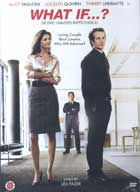
What If…? 2007
Distributed by First Run Features, 630 Ninth Avenue, Suite 1213, New York, NY 10036; 212-243-0600
Produced by Carole Scotta, Caroline Benjo, Simon Arnal, Barbara Letellier
Directed by Léa Fazer
DVD , color, 78 min.
Jr. High - General Adult
Sociology, Storytelling, Film, France
Date Entered: 03/31/2014
Reviewed by Jennifer Dean, Graduate of the CUNY Graduate Center MALS program with thesis on female filmmakers.Léa Fazer’s film What If…? opens with two sisters, Margot and Juliette, arguing in Margot’s office, a law firm where she works with her lover Victor. The rapid fire dialogue, a kind of modern day His Girl Friday, makes clear the perspectives of the two siblings. Margot is a career woman working her way up the law firm ladder; Juliette is a bitter divorcée who gave up her career to raise children. Soon after, Victor enters the scene to add to the witty repartee and then we see an attorney through the glass doors clutching his chest, clearly suffering a heart attack. After the death of the attorney, Margot and Victor both are up for the position of partner in the firm. The rest of the film vacillates between two different scenarios. One where Victor is awarded the partnership after Margot falls and breaks a heel while running to the interview. The other where Margot decides to wear pants to the interview and becomes partner while Victor remains as an associate.
What If…? is a kind of politically infused version of Peter Howitt’s 1998 film Sliding Doors starring Gwyneth Paltrow. The potential to delve into the complexities of women in the workplace and relationships are numerous but the simplicity of the set-up and many of the ensuing incidents belie what would otherwise be a nuanced concept. The idea that a couple would both be up for the very same job seems a bit contrived and although different aspects of the sexism Margot endures are explored in either scenario – both scenarios also promote certain stereotypes. In both plots Margot and Victor get married. In the version where Margot becomes partner she appears glamorous and composed. In the version where Victor wins out she is much dowdier in appearance. In one of the final scenes where she learns of Victor’s affair with his secretary (an unfortunately trite plot point), she parrots her sister’s words from the beginning about giving up her career to mind the children. In the scenario where Margot “wins” the partnership she overhears a conversation with a couple of employees from the firm suggesting she slept her way to the top, which unfortunately does have some merit – since she does eventually sleep with her boss. This appears to imply that she got the promotion because of his interest in her as a sexual object and not necessarily because of her skills as an attorney.
The performances by all of the actors are superb (Alice Taglioni as Margot, Jocelyn Quivrin as Victor, Pascale Arbillot as Juliette). The film is beautifully shot with witty dialogue which seamlessly allows for interplay between the two scenarios. There are moments of sharp commentary on gender and society, including a scene where Juliette’s children are studying grammar and their grandmother explains that when an adjective refers to both a masculine and feminine noun it must be masculine because it is the strongest. However, the affairs that both characters engage in detract from the overall storyline and seem sensationalistic. The film is entertaining but could go further in exploring the politics of gender. Nonetheless, the ending is poignant. Tragedy befalls the couple whether Victor or Margot becomes partner, so they relive an alternate ending where neither go to the interview and they escape, running from the office to cross a Parisian bridge named after Simone deBeauvoir, author of the seminal feminist text The Second Sex.